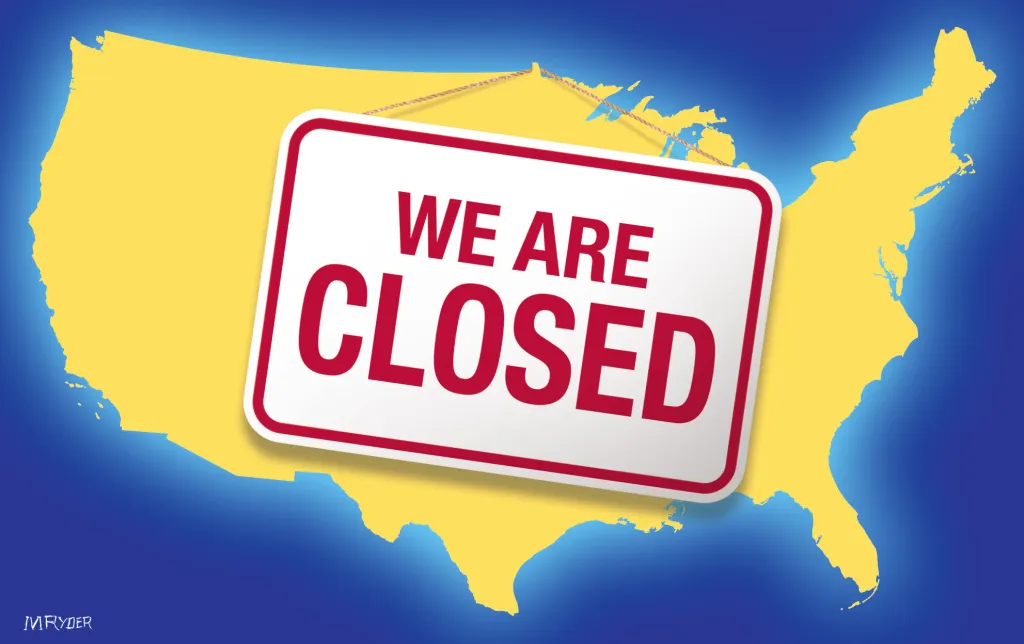Copyright Santa Rosa Press Democrat

Back in September, when I was reporting an article on whether Democrats should shut down the government, I kept hearing the same warning from veterans of past shutdown fights: The president controls the bully pulpit. He controls, to some degree, which parts of the government stay open and which parts close. It is very, very hard for the opposition party to win a shutdown. Which makes it all the more remarkable that Democrats were winning this one. Polls showed that most voters blamed Republicans, not Democrats, for the current shutdown — perhaps because President Donald Trump was bulldozing the East Wing of the White House rather than negotiating to reopen the government. Trump’s approval rating has been falling — in CNN’s tracking poll, it dipped into the 30s for the first time since he took office again. And last week, Democrats wrecked Republicans in the elections and Trump blamed his party’s losses in part on the shutdown. Democrats were riding higher than they have been in months. Then, over the weekend, a group of Senate Democrats broke ranks and negotiated a deal to end the shutdown in return for — if we’re being honest — very little. The guts of the deal are this: Food assistance — both SNAP and WIC — will get a bit more funding, and there are a few other modest concessions on spending levels elsewhere in the government. Laid-off federal workers will be rehired and furloughed federal workers given back pay. Most of the government is funded only until the end of January. (So get ready: We could be doing this again in a few months.) Most gallingly, the deal does nothing to extend the expiring Affordable Care Act tax credits over which Democrats ostensibly shut down the government in the first place. All it offers is a promise from Republicans to hold a vote on the tax credits in the future. Of the dozen or so House and Senate Democrats I spoke to, every one expected that vote to fail. To understand why the shutdown ended with such a whimper, you need to understand the strange role the ACA subsidies played in it. Democrats said the shutdown was about the subsidies, but for most of them, it wasn’t. It was about Trump’s authoritarianism. It was about showing their base — and themselves — that they could fight back. It was about treating an abnormal political moment abnormally. The ACA subsidies emerged as the shutdown demand because they could keep the caucus sufficiently united. They put Democrats on the right side of public opinion — even self-identified MAGA voters wanted the subsidies extended — and held the quivering Senate coalition together. You shut the government down with the Democratic caucus you have, not with the Democratic caucus you want. But the shutdown was built on a cracked foundation. There were Senate Democrats who didn’t want a shutdown at all. There were Senate Democrats who did want a shutdown but thought it strange to make their demand so narrow: Was winning on health care premiums really winning the right fight? Should Democrats really vote to fund a government turning toward authoritarianism as long as health insurance subsidies were preserved? And what if winning on the health care fight was actually a political gift to Trump? Absent a fix, the average health insurance premium for 20 million Americans will more than double. The premium shock will hit red states particularly hard. Tony Fabrizio, Trump’s longtime pollster, had released a survey of competitive House districts showing that letting the tax credits expire might be lethal to Republican efforts to hold the House. Why were Democrats fighting so hard to neutralize their best issue in 2026? The political logic of the shutdown fight was inverted: If Democrats got the tax credits extended — if they “won” — they would be solving a huge electoral problem for Republicans. If Republicans successfully allowed the tax credits to expire — if they “won” — they would be handing Democrats a cudgel with which to beat them in the elections. This is why Sen. Chuck Schumer’s compromise, which offered to reopen the government if Republicans extended the tax credits for a year, struck many Democrats as misguided. Morally, it might be worth sacrificing an electoral edge to lower health insurance premiums. But a one-year extension solved the Republicans’ electoral problem without solving the policy problem. Why on earth would they do that? In any case, Republicans were not interested in Schumer’s offer. Trump himself has shown no interest in a deal. Rather than negotiating over health care spending, Trump has been ratcheting up the pain the shutdown is causing. Hundreds of thousands of federal workers have been furloughed or fired. The administration has been withholding food assistance from Americans who desperately need it. Airports are tipping into chaos as air traffic controllers go without pay. More than anything else, this is what led some Senate Democrats to cut a deal: Trump’s willingness to hurt people exceeds their willingness to see people get hurt. I want to give them their due on this: They are hearing from their constituents and seeing the mounting problems, and they are trying to do what they see as the responsible, moral thing. They do not believe that holding out will lead to Trump restoring the subsidies. They fear that their Republican colleagues would, under mounting pressure, do as Trump had demanded and abolish the filibuster. (Whether that would be a good or a bad thing is a subject for another column.) This, in the end, is the calculation the defecting Senate Democrats are making: They don’t think a longer shutdown will cause Trump to cave. They just think it will cause more damage. If I were in the Senate, I wouldn’t vote for this compromise. Shutdowns are an opportunity to make an argument, and the country was just starting to pay attention. If Trump wanted to cancel flights over Thanksgiving rather than keep health care costs down, I don’t see why Democrats should save him from making his priorities so exquisitely clear. And I worry that Democrats have just taught Trump that they will fold under pressure. That’s the kind of lesson he remembers. But it’s worth keeping this in perspective: The shutdown was a skirmish, not the real battle. Both sides were fighting for position, and Democrats, if you look at the polls, are ending up in a better one than they were when they started. They elevated their best issue — health care — and set the stage for voters to connect higher premiums with Republican rule. It’s not a win, but given how badly shutdowns often go for the opposition party, it’s better than a loss. Ezra Klein is a columnist for the New York Times.



